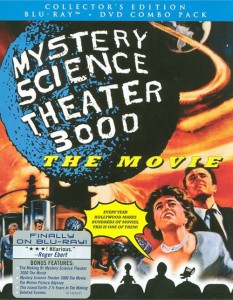From the Chicago Reader (April 19, 1996). — J.R.

Mystery Science Theater 3000: The Movie 0 (no stars)
Directed by Jim Mallon
Written by Michael J. Nelson, Trace Beaulieu, Mallon, Kevin Murphy, Mary Jo Pehl, Paul Chaplin, and Bridget Jones
With Beaulieu, Nelson, Jeff Morrow, Rex Reason, Faith Domergue, and the voices of Mallon and Murphy.

The premise of the recently discontinued cable-TV series on which this film is based is more or less as follows: a blustering mad scientist named Dr. Clayton Forrester (Trace Beaulieu) plots to take over the world. His plan? According to the Mystery Science Theater 3000: The Movie press book: “Find the worst movies ever made, show them to the entire population and bring the planet to its knees.” He kidnaps Mike Nelson (Michael J. Nelson) to serve as a guinea pig, takes him to the Satellite of Love, and makes him and his three robot pals — Tom Servo, Gypsy, and Crow — watch the Worst Movies Ever Made. But Mike and his friends confound the experiment by talking back to the screen and making wisecracks. We watch the movies too — or parts of them, since the lower portion of the screen is partially blocked by the silhouettes of Mike and two of the robots. Read more
Posted on the web site Wellesnet. I’ve added a few illustrations of my own to the original, conducted by Lawrence French.
Having worked as a consultant on the completion of The Other Side of the Wind, I’m no longer sure that all my comments about the film found below would still hold. — J.R.
Jonathan Rosenbaum has long been an astute critic on the cinema of Orson Welles, frequently writing about Welles’ films. He served as the consultant for the re-edited version of TOUCH OF EVIL, and edited THIS IS ORSON WELLES, the seminal book of Welles interviews, conducted by Peter Bogdanovich.
The following interview has been combined from two separate conversations. The first took place in the fall of 1998, after the release of the re-edited version of TOUCH OF EVIL, and focused on the problems inherent in changing TOUCH OF EVIL to what Welles requested in a memo written 41 years earlier. The second interview occurred in January, 2003, and covers Welles’ two
LAWRENCE FRENCH: Does the film museum in Munich now have most of the unfinished Welles films? Read more
From Cineaste, Vol. XXXIII, No. 4, 2008. -– J.R.
1) Has Internet criticism made a significant contribution to film culture? Does it tend to supplement print criticism or can it actually carve out critical terrain that is distinctive from traditional print criticism? Which Internet critics and bloggers do you read on a regular basis?
1) a. Significant and profound. Because the changes it has wrought are ongoing and unfolding, it’s still hard to have a comprehensive fix on them.
1) b. It can and does do both. By broadening the playing field in terms of players, methodologies, audiences, social formations, and outlets, it certainly expands the options. The interactivity of almost immediate feedback, the strengths and limitations of being able to post almost as quickly as one can think (or type), the relative ease of making screen grabs — these and many other aspects of Internet discourse are bringing about changes in content as well as in style and form, shape and size.
1) c. Here’s just a sample: To varying degrees (some much more regularly than others), I like to read Acquarello, David Bordwell, Zach Campbell, Fred Camper, Roger Ebert, Flavia de la Fuente, Filipe Furtado, Michael E. Read more


